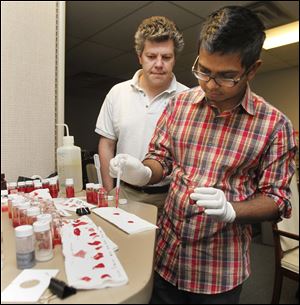
Spectra tests artificial blood
Local firm seeks pact for Army training material
6/20/2012
Alex Mejiritski, president of Spectra Group Limited, watches chemist Puran De test synthetic blood the company is making. One firm will be selected to provide the artificial blood.
MILLBURY -- A red blob of fake blood slowly soaked into gauze in the lab at Spectra Group Limited Inc.
Another sample quickly rolled away from the spot where a chemist released it from a pipette. The last drop lingered before spreading out and staining the gauze crimson.
Researchers at the Millbury company are trying to craft the perfect synthetic blood -- a product that will look, feel, and act like real blood -- for use in military training. It's all about finding the right consistency and color, said Alex Mejiritski, president of the firm.
"The idea is that in today's battlefield, a lot of death occurs from exsanguination," Mr. Mejiritski said, using the technical term for excessive loss of blood. "If someone has a limb torn off, they tend to lose a lot of blood."
The synthetic blood will be used in training demonstrations for military personnel who must learn to stop profuse bleeding just after it starts. The synthetic blood is loaded into a pack that's worn by a trainee who will unexpectedly begin bleeding during an exercise, Mr. Mejiritski said.
The pack is no bigger than a small backpack, mimics the rhythm of a heart, and pumps the blood in intervals. The trainees only have a short time -- usually less than a minute -- to stop the bleeding.
"Mainly, right now we are playing with the consistency," said Puran De, one of the chemists on the project.
Realism is key to the training, said Maj. Patrick O'Neil at Fort Sam Houston, which is part of Joint Base San Antonio. The fake blood used in training exercises should be as close to the real thing as possible. The military currently uses a powdered synthetic blood that it must mix before training, he said.
"We would go with something that would have to be realistic. It would have to be better than what we're using," he said, adding that cost would be a factor.
Spectra's synthetic blood comes in a liquid form, and the company is one of a handful vying to win the contract from the Army.
The company typically creates photopolymer products, which change when exposed to light, but decided to venture into the synthetic-blood industry when it heard about the contract.
Spectra is pursuing the initiative under the Small Business Innovation research program, which has a three-step process for awarding government contracts.
The first step involves an open call to companies interested in making a product. In the second, a few companies are chosen and given funding to develop that product. Once those products are tested and a company is selected by the government, it is commercialized in phase three.
Spectra is in the second part of that process and has been granted $1 million for two years to develop the synthetic blood, Mr. Mejiritski said.
When all is said and done, a liter of the blood should cost less than a gallon of milk, Mr. Mejiritski said. The synthetic blood has a water base and other chemical compounds added to thicken it, he said.
The almost 30 test vials of the blood in the lab this week looked like small bottles of nail polish. The shades of red, as well as the thickness, of the liquids varied from sample to sample.
The blood is harmless and isn't made from animals or people, Mr. Mejiritski emphasized. The company could produce up to 7,500 liters of the substance a year if it is awarded the contract.
It's unclear how much the company could profit from producing the synthetic blood because the product is still in the testing phase, Mr. Mejiritski said.
Contact Kris Turner at: kturner@theblade.com or 419-724-6103.